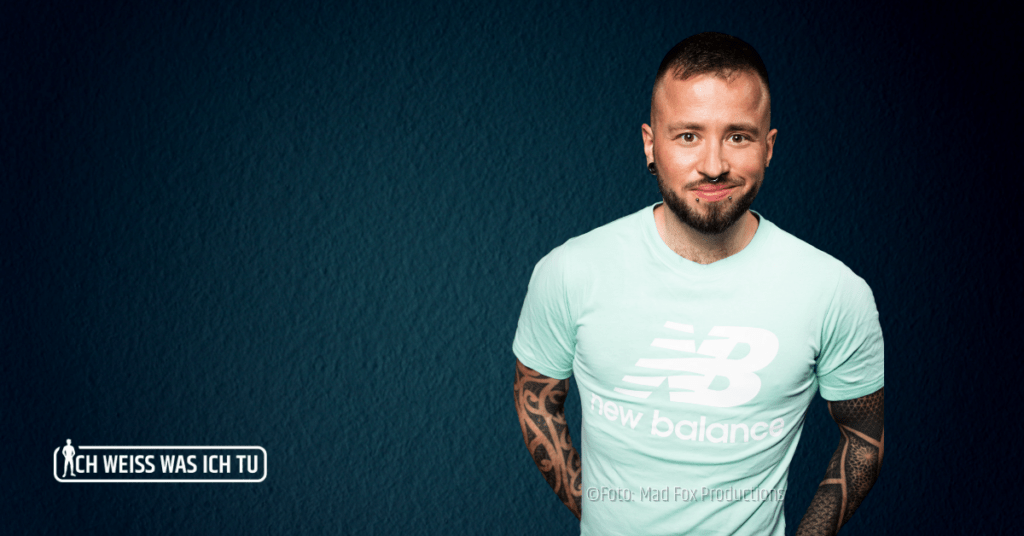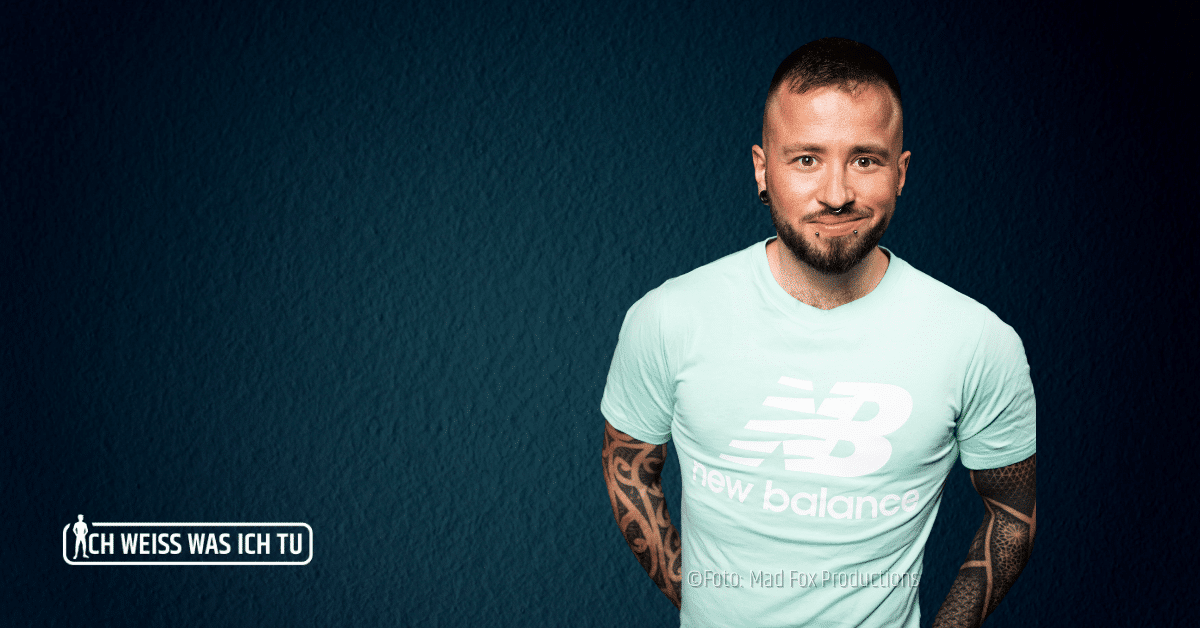For the first time, Max Appenroth, an openly trans* person, was elected Mr Gay Germany. We spoke to Max about the contest, trans* hostility in the gay community and Max's campaign #ProudToBeAlive.
Trigger warning: This interview is about trans* hostility, mental well-being and suicide, among other things.
Max, you've had several coming-outs, would you like to tell us about them?
When I was 13, I came out as a lesbian. It was my first coming out. At the time, it felt wrong for me as a "woman" with men. At some point I realised that I wasn't a woman and had another coming out as trans*. I also more or less came out as a gay person because my identity and my changed appearance gave me access to other spaces such as gay bars and saunas and allowed me to live my sexuality differently. Then two years ago I had a different kind of coming out as a non-binary trans* person. So I feel comfortable in the male spectrum, but I am clearly more than "just" a man.
| What does the term "non-binary people" mean? |
| Non-binary people can see themselves as "both male and female" or as "neither male nor female" or reject the dual-gender construct altogether. |
When did you feel most comfortable in your body during this time?
Now I feel very comfortable in my body. I don't like the narrative that trans* people are born in the wrong body. I was born in the perfect body! There was only one time when I didn't feel comfortable with certain parts of my body and wanted to modify them to feel 100% comfortable in this body. That was ten years ago when I had an operation to have my breasts removed. Since then, my body is just perfect the way it is.
| What does the term "transition" mean? |
| Transition describes the (medical, legal, social, physical) process of people who do not identify with the gender assigned to them at birth to express and approximate their gender identity and physical experience. |
What was the route to the operation like?
Difficult! Finding expert information on the subject of transition is not easy. You have to find out everything for yourself: What do I want? What options do I have? In addition, in Germany it usually takes one to two years from the application to the health insurance company to the operation. And the applications are often rejected. Then you have to appeal and then wait again for processing until you finally get the OK. I wouldn't have been able to stand it any longer, both mentally and physically, because I had my breasts tied off and everything pressed flat. That means your chest is permanently compressed, you can't breathe, you can't really walk upright, you have back pain. So I had my breast operation in the USA. I had to pay a lot myself, but it meant I could avoid a really bad process with the health insurance company and get to my destination faster.
| What does the term "cis men" mean? |
| Cis men were assigned the gender "male" at birth and they still identify with it today. |
Does the infrastructure of Germany's queer scene lack prevention messages and organisations for trans* people?
Absolutely! Even though Germany is generally a great country when it comes to healthcare, this doesn't apply to trans* people because there is far too little knowledge about our bodies and needs. Even in queer initiatives that are committed to healthcare, much more simply needs to be done so that we are seen and can really participate. In other words, not that something is done for us by someone, but that we as a community are allowed to do it for ourselves.
For example, prevention campaigns: If no trans* people are involved, how do you know how best to address the community? If only gay cis men can be seen on all the posters, but no trans* people, I don't feel addressed. You simply have to look at how you represent the communities and how you work with them in order to really do the best possible work that also reflects the needs of the community. I work primarily in the field of HIV prevention, especially for trans* people, and I can see how much work still needs to be done.
| Gay. Trans*. Part of the scene! |
| Our brochure "Gay. Trans*. Part of the scene!" offers gay trans* and cis men, gender-nonconforming and non-binary people who feel part of the gay community all the information they need on respectful behaviour within our diverse scene, gay sex and protection against HIV (safer sex). Brief information on trans* history and important activists as well as links to more information round off the brochure. You can find it at iwwit.de/trans! |

How can your work and the community benefit from your victory as Mr Gay Germany?
Thanks to the increased visibility I now have, more people follow me on social media or I am invited to various events. This gives me more reach and of course also has an impact on my work because more people are aware of the problems and the difficult situation and are listening.
What was your motivation to take part in the competition?
I stumbled across it by chance on social media and realised that it's not just a beauty contest, but that content takes centre stage. Each person has to stand up for a specific issue and launch a campaign for it. I thought that was pretty cool and got to grips with it. As a trans* person, I always get hostility from the gay community, so I also thought that I would like to show people in a contest like this that we trans* people are very much part of the community.
"Just because they can't imagine having sex with a trans* person doesn't mean that has to apply to everyone in the gay community."
So you experience discrimination from the gay community?
The gay community is one of my communities and I feel at home there. But sometimes I hear things like "You have no place here" or "That's not a "real" man, so you can't be in the gay community". Maybe there's a lack of education here: not everyone has to find me attractive or imagine going to bed with me. I don't want to go to bed with everyone either. But just because I personally can't imagine something, or don't like something, doesn't mean that others can't like it. Just because they can't imagine having sex with a trans* person doesn't mean that everyone in the gay community has to.
"You don't have to be able to understand my identity to accept me."
What would you say to these people?
As trans* people, we are not taking anything away from anyone. I don't want to abolish any gender. I just want to be able to live with respect and dignity, just like everyone else. People don't have to be able to understand my identity to accept me. I can't understand a lot of things either. But that doesn't mean it can't exist just because I don't understand it. Nevertheless, this is the best proof that my work for more trans* visibility is still needed, and in fact, comments like this act like petrol in my engine. That's exactly why I'm doing more.
"For me, comments like that are like petrol in my engine."
Back to the competition: how did it go?
Everything went relatively quickly. I applied online at the end of October and had my first telephone interview a week later. Then I had to develop a community campaign in the next three days. I thought about a campaign and presented it. Shortly afterwards, I found out that I was in the semi-finals. Between the semi-final and the final, you have to continue building the campaign to show the jury in the final how you are working on it. The final came exactly six weeks after the first phone call.
The other competitors were of different ages and backgrounds. Not all of them were totally slim and muscular either, but simply had different body shapes. I thought it was nice to see that it wasn't just about muscle-bound cis men. It was a short, intense time, but when I heard my name in the final, it was an indescribable moment. It was a huge load off my mind.
What is your campaign about?
It is called #ProudToBeAlive (proud to be alive) and deals with the high suicide rate among queer teenagers and young adults. Unfortunately, this is a topic that we rarely talk about. I would like to improve this situation in two ways: Firstly, by creating a professional crisis support structure for young LGBTQIA+ in the form of online counselling parallel to telephone counselling, through which help is offered in acute situations.
And in the long term, I want to increase the visibility of queer people in children's and young adult literature. When queer children and young people see in children's books that there are other people who are just like them - in other words, when they always find themselves - they get the feeling that they are not alone. And that you are okay just the way you are. I believe that if they realise this from an early age, they could lead a completely different life than if they had to cope with it alone. My first trans*-empowering children's book will be published in German and English at the beginning of April, it's called "No matter what changes, the heart remains exactly the same".
Max, good luck with it and thank you very much for the interview!
Trans* men, non-binary and gender non-conforming people are part of the gay scene! Find out more about our campaign "Gay. Trans*. Part of the scene!" Click on www.iwwit.de/trans!
| Gay Health Chat |
| Are you looking for someone to talk to? Someone who will listen to you and possibly give you advice? Then chat with counsellors from the community at www.gayhealthchat.de! |
| Hint |
| There are situations that are anything but easy. There is help here: - Telephone counselling: 0800-1110111 and 0800-1110222 – German Depression Relief Foundation |










